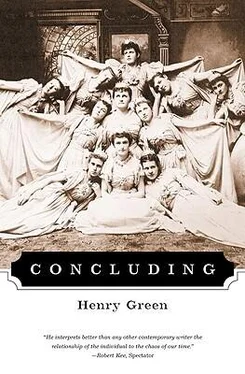There were even moments when Daisy actually knelt, and all was still.
He would never get her home, he knew. She would have to be left to make her own way back at meal time, but there had been no other excuse to go down by the water, and someone had to after the poor girl, because those evil ninnies, whose absolute power so absolutely corrupted them, were too muddleheaded, or imperious, to see what must be done in merest human charity. Ted, his goose, covered a deal of ground each day, besides he had no call to look for her, and then pigs, as was well known, possessed a sense of smell which might come in handy amongst thick reeds. Imagine not organising a search as soon as they had learned, the fabulous Neroines, already tuning their fiddles before the rout, the fireman's ball.
He wiped his forehead with the back of a hand, after which he polished the spectacles. He clucked at Daisy to encourage her, then found that he had come into full sunlight, and could see the lake at last.
On the side by which he was approaching, water was dammed well up above ground level, a white mirror almost to the level of his eyes, and out of which grew rushes, pink and green, with willows and other smaller gray bushes everlastingly leant over their several likenesses in a faint lakeside, sunlit smell of rotting, for perhaps all of three times seventy years.
He reminded himself that he should not come out from the shelter of the trees, must not be seen. Daisy would be his eyes.
At the scent of the lake she suddenly trotted forward, burst through a little undergrowth with a great amount of noise and, while he stepped back into concealing shade, she halted at the brink, nose up, ears folded forwards over violet eyes, and with deeply heaving flanks, by which Mr Rock assumed she must wish to challenge, or had sensed, someone on the further bank to whom, in her startled whiteness, she might seem his goose, he thought, if the person had not got his or her right spectacles.
All was still, not a bird moved, but the sun was already turning edges of green leaves red, and soon it would be time for russet pheasants roosting.
Meantime Miss Baker, going down to this lake another way, for all her fat moved silently to come upon the sergeant seated on a log in the traditional attitude, a high helmet on the ground at the side, mopping his brow with a red, bandanna handkerchief.
She was much settled at the sight of him, took it for proof that Edge, when that lady interviewed the man, had counselled his keeping an eye upon the place.
"Why sergeant," she said, therefore, in an arch voice, "this is a pleasure I must say's entirely unexpected."
He jumped as though he had been shot.
"Why Miss Baker, ma'am," he exclaimed. Getting up he replaced the helmet with a guilty movement.
"It has been warm, certainly."
"It has that," the man replied.
"Take a few steps with me," she invited. "And to what do we owe this pleasure?" she asked, as he fell in at her side.
"I was up at the house this noon, ma'am," he answered.
Baker did not know how much her colleague had given away, but she, like Miss Edge before her, would never be so injudicious as to disclose that what one of them did could be without the consent, and full agreement, of the other.
"I don't fancy there's much in all this," she said about the disappearance. He kept in mind Miss Edge's hint as to men of a certain age and replied, "I'm right glad to hear you say so, ma'am."
"Really?" she asked. "You've some information that hasn't yet reached us, perhaps?" She was overconfident. She was so sure that all would yet be well.
"Not us, we haven't," he said. But he considered these two women were not being straight with the police. It was why he had returned to what he called 'the scene.' So he added, "Then you've a student still missing, ma'am?"
Baker did not realise that her colleague, when she talked with the sergeant, had, as usual, pursued a devious course.
"Why yes," she answered. "Well, after all," she went on. "What does one mean when one says missing?"
This struck an answering note in the sergeant's head. At the station much of their time was taken up with young women adrift, who, after fourteen days, returned brown and happy from a fortnight with a boy by the ocean.
"You've got something there, ma'am," he agreed.
"It's a question of degree," she elaborated.
"I wonder if I might put a question, ma'am?" the policeman said, his doubts back again. "What does Miss Edge have in view?"
"I'm afraid she's very worried, sergeant."
"On what grounds, miss?"
Baker then made the mistake of taking the man for a fool. "Why because we have a girl absent, of course," she said.
"Strange Miss Edge should never mention the disappearance, when she had me along only this morning." Baker's heart fell. The sergeant had spoken quite disagreeably. It was now obvious that one had to be careful with him. Oh, what had her colleague been about?
As warily as possible she began to explain the danger of Reports, and how fatal these were to a girl's chances if they had to be written.
"In their own best interests we leave it to the very last, except for impossible cases, of course. To tell you the honest truth, as one State Official to another," she tried to humour him, "in nearly every instance we manage to forget to make one out, sergeant."
"Yes, ma'am, we also have reports to render. And it goes hard with us if there's a fatality we don't know all about, almost before it's happened."
"A fatality?" Baker echoed, with a wail.
"To a manner of speaking," the policeman said, in a low voice.
At this moment they came within sight of the water and Daisy, from a considerable distance, saw them first. She gave a warning grunt, which made Mr Rock look twice. He then noticed Baker with the sergeant, and again had the unreasoned impulse that he must explain his presence, for which he could not, he felt, account by merely saying he had taken Daisy for a stroll. So, instinctively, and with the swill man's yell, he called out "Ted."
Because he faced the great house, the echo volleyed back at him, "Ted, Ted."
"Good heavens, what was that?" Baker asked.
"Man shouted," the sergeant said, his eye on the middle distance.
"It was a man, wasn't it?" Miss Baker quavered, to be reassured.
"I do believe it's Mr Rock, miss," the sergeant replied, in a careful voice. "Indeed, if I'm not much mistaken, he has the porker with him."
"He may have found something," Baker objected.
"In such case, no doubt he'll sing out again."
"But shouldn't we go over at once, sergeant?"
"One moment, ma'am, if you will allow me. I just wanted to put a question regarding Mr Rock."
"Yes?" Oh what had Edge done?
"Does he see much of your girls, ma'am?"
"He lives on the place, you understand," she said.
"How did that come about?"
Baker then gave Mr Rock's history, in some detail, to explain his presence, and added what she knew of the coming election to an Academy of Sciences or State Sanatorium. The sergeant was left with the idea that Mr Rock was joyfully packing up to leave.
"I see, ma'am," he commented, heavily non-committal.
"Now, since he hasn't called a second time, shall we go over?" And they started off.
It was not until they were half way, that the policeman was certain of the pig.
"He's got his sow along after all," he confirmed.
"Good heavens, not his pig, surely?" Baker echoed Miss Edge, afraid the sergeant might be referring to Elizabeth.
"He'll have his work cut out to drive her home when he wants," the man said, with satisfaction.
In another few minutes they came up to Mr Rock, who stood his ground. Daisy fled a few paces, and squealed in what was perhaps simulated horror. And Baker gave a small gesture of distaste, which did not escape the sage.
Читать дальше












